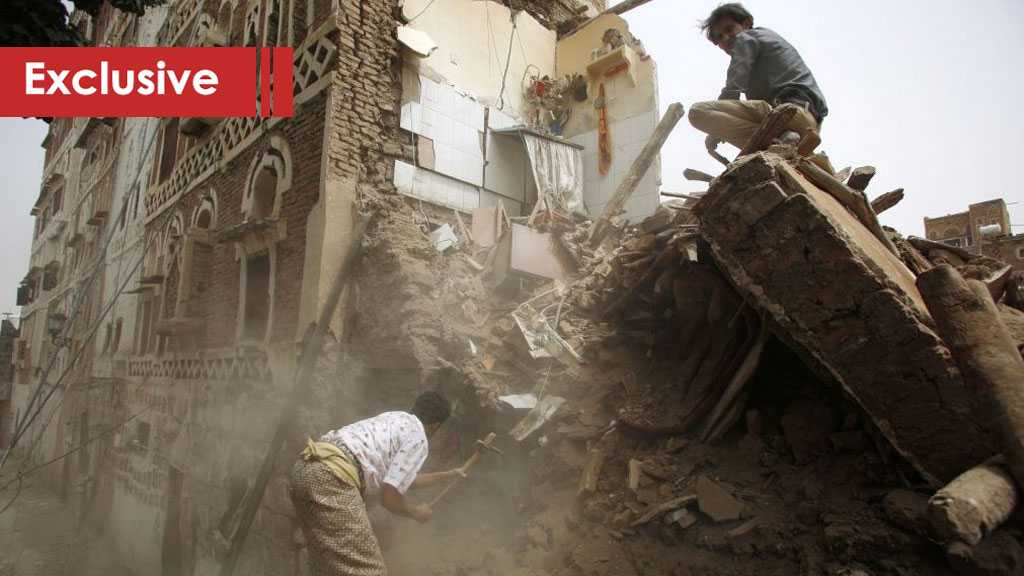
Wake Up World! Stories of Yemenis Suffering on Every Humanitarian Level…

By Yahya Salah El-Din
Saudi War on Yemen Traumatizing Yemeni Children
Twelve-year-old Badriya lives with her family in a village that overlooks Yemen’s Western Coast. In her childhood, she used to live with a caring family. Everything was ok before the war marred her with a scar.
Sounds of blasts and clashes at the Western Coast were not regular when Badriya decided to go outside her home to buy some stuff. The little girl didn’t know that this calmness will later leave behind a storm of destruction. It was just a moments before the Saudi-led coalition’s rockets started randomly hitting civilians’ houses over the heads of their residents. People rushed to hide in a natural human desire to survive, and so did Badriya, but she thought she had to rush to the house instead of hiding somewhere she thinks it would be more secure.
Badriya saw her home turned into rubble, with her family members inside. Hysterically, she started running randomly, without knowing where she is heading to… The little girl reached a highway that links the Western Coast with other provinces. There she met good doers who accompanied her to Sanaa and took her to an orphanage.
Badriya’s first days at the orphanage were the most difficult time she has passed through… all psychological effects following the scene of the massacre she had witnessed were storming her mind and imaginary. She spent several days experiencing despair, grief, loss of appetite, introversion, isolation, and sleep disturbances accompanied with nightmares related to the incident.
Specialists at the orphanage had a hard task to help Badriya overcome the consequences of her trauma. It was getting along with her fellow orphans what helped her most adapt with her new place. Additionally, the social atmosphere helped the little girl join the orphanage’s activities and she started a literacy course along with professional programs.
Badriya, who said she loves sweets, wishes to build an orphanage in the Western Coast, where she used to live with her family. The traumatized little girl also wishes that this cursed war, which displaced Yemeni children as her, stops and peace prevails across her country.
Forced Displacement
Samer, a father of a little girl from Yemen’s Taiz, was born and raised in Aden. He works for a private company there, and is responsible for his family, composed of his parents and four siblings.
One day, Samer and his family were walking in the city of Aden when they were stopped by a UAE-backed Transitional Council checkpoint. They were asked to show their identity cards. When they saw them, the militants immediately arrested Samer and his family under the pretext that they from the northern Taiz province. Along with other individuals, they were taken to a wide, open place surrounded with militants. Many children, women, and elderly were cramped there. The place was full of children crying and women decrying the unethical and inhumane treatment they were subject to by the Transitional Council’s militants.
Many other elderly where shouting because their children disappeared and they don’t know their whereabouts. We heard that we will be killed, the same fate dozens of individuals from southern provinces faced. This was documented on social media in which many videos circulated showing the heinous killing of many and forcing many others to move from Aden. They didn’t commit any crime; it is just because they come from northern Yemen.
Suddenly, the armed groups forced all people in that place to mount huge vehicles. Their merciless practices didn’t allow the detainees to resist. Samer and his family members climbed one vehicle, along with all other detained individuals.
People in the crowded vehicles were lamenting that they left all their savings in Aden and were forced to return to the north without getting with them any of their possessions. When the vehicles arrived at the last point controlled by the UAE-backed council, people were thrown off the road, with the cries of children and women echoing in the place.
“We represent one group, others preceded us, but there were still remaining northerners who were expecting the same fate, just like what happened with us,” Samer said.
Fuel Crisis, a Slow killing
Lack of fuel due to banning oil ships from reaching the Hudaydah seaport by the US-backed Saudi-led coalition of aggression against Yemen has set lives of patients in hospitals at a level of grave danger, and made lives of practitioners more difficult.
Mohammad al-Ghazali, a dialysis patient, suffers from the frequent malfunctioning of the dialysis machine in the Yemeni capital Sanaa due to the severe shortage of fuel in the country’s north.
Mohammad, who expects his death at any moment, said he didn’t imagine that he would die because the machine has no fuel to function.
He said tearfully: “This is brutality and a crime against humanity, why do they prevent us from accessing fuel?”
Doctors also confront similar circumstances difficultly. When the machine stops, nurse Mohammad al-Hotami tends to operate it manually so that it prevents the patient from blood clots. “We try our best,” he explained.
“We have been suffering from oil shortage over the past six years of brutal Saudi war that exhausted Yemen’s healthcare system,” al-Hotami said.
It is worth noting that Yemen’s oil imports necessary for operating electric generators, water pumps and transferring goods have declined over the past three months, deepening the country’s humanitarian crisis that has already pushed 80% of Yemen’s population to depend on aid to survive. Likewise, the lives of thousands of patients are at risk of death, though it is happening slowly.



